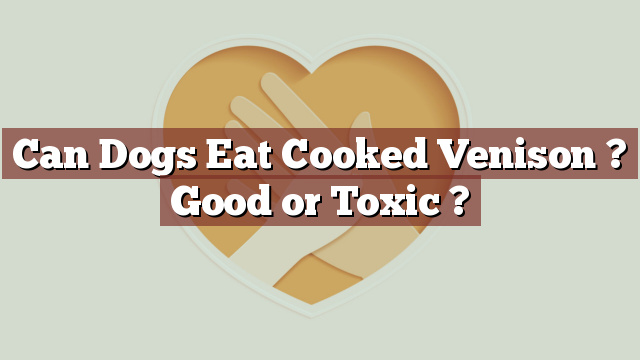Can Dogs Eat Cooked Venison? Good or Toxic?
As responsible dog owners, it is crucial to be aware of what foods are safe for our furry friends to consume. Among the many questions that arise, one that often comes up is whether dogs can eat cooked venison. In this article, we will delve into the nutritional value of cooked venison, explore its safety for dogs, examine the potential risks and benefits, and provide action steps for pet owners if their dogs have consumed this meat.
Nutritional Value of Cooked Venison: Essential Information for Dog Owners
Cooked venison, derived from deer, is a lean and protein-rich meat that contains essential nutrients beneficial for dogs. It is an excellent source of high-quality protein, which is crucial for the growth, repair, and maintenance of their muscles. Additionally, venison is rich in iron, zinc, and B vitamins, such as niacin and vitamin B12, which contribute to a healthy immune system and optimal energy levels.
Is Cooked Venison Safe for Dogs to Eat? Unveiling the Truth
Yes, dogs can safely eat cooked venison as long as certain precautions are taken. It is important to ensure that the venison is fully cooked to eliminate any potential harmful pathogens that could pose a risk to your dog’s health. Furthermore, it is crucial to remove all bones from the cooked meat, as bones can splinter and cause choking hazards or puncture the digestive tract.
However, it is essential to note that dogs with certain health conditions, such as pancreatitis or food allergies, may not tolerate venison well. In such cases, it is best to consult with a veterinarian before introducing cooked venison into their diet.
Potential Risks and Benefits of Dogs Consuming Cooked Venison
While cooked venison can provide numerous health benefits to dogs, it is important to be aware of potential risks. One potential risk is the presence of parasites or bacteria in the meat, which can cause foodborne illnesses in dogs. This risk can be minimized by ensuring the venison is thoroughly cooked, as mentioned earlier.
On the other hand, the benefits of dogs consuming cooked venison include its high protein content, low fat content, and the presence of essential vitamins and minerals. These nutrients contribute to a healthy coat, strong muscles, and overall well-being.
My Dog Ate Cooked Venison, Now What? Action Steps for Pet Owners
If your dog has consumed cooked venison, there are a few action steps you should consider. Firstly, if the meat was fully cooked and there were no bones involved, you may not need to take any immediate action. However, if your dog shows any signs of illness, such as vomiting, diarrhea, or lethargy, it is essential to contact your veterinarian for guidance.
In cases where the venison was undercooked or bones were consumed, it is advisable to seek veterinary assistance immediately. They will be able to assess the situation and provide appropriate treatment if necessary.
Conclusion: Cooked Venison Can Be Safe, but Caution is Key
In conclusion, dogs can safely consume cooked venison, benefiting from its rich protein content and essential nutrients. However, caution must be exercised to ensure the meat is fully cooked and bones are removed. Additionally, if your dog has any underlying health conditions, it is crucial to consult with a veterinarian before introducing cooked venison into their diet. By following these guidelines and being vigilant, you can confidently incorporate cooked venison into your dog’s diet, knowing that you are providing them with a nutritious and safe food option.
Thank you for investing your time in exploring [page_title] on Can-Eat.org. Our goal is to provide readers like you with thorough and reliable information about various dietary topics. Each article, including [page_title], stems from diligent research and a passion for understanding the nuances of our food choices. We believe that knowledge is a vital step towards making informed and healthy decisions. However, while "[page_title]" sheds light on its specific topic, it's crucial to remember that everyone's body reacts differently to foods and dietary changes. What might be beneficial for one person could have different effects on another. Before you consider integrating suggestions or insights from "[page_title]" into your diet, it's always wise to consult with a nutritionist or healthcare professional. Their specialized knowledge ensures that you're making choices best suited to your individual health needs. As you navigate [page_title], be mindful of potential allergies, intolerances, or unique dietary requirements you may have. No singular article can capture the vast diversity of human health, and individualized guidance is invaluable. The content provided in [page_title] serves as a general guide. It is not, by any means, a substitute for personalized medical or nutritional advice. Your health should always be the top priority, and professional guidance is the best path forward. In your journey towards a balanced and nutritious lifestyle, we hope that [page_title] serves as a helpful stepping stone. Remember, informed decisions lead to healthier outcomes. Thank you for trusting Can-Eat.org. Continue exploring, learning, and prioritizing your health. Cheers to a well-informed and healthier future!

